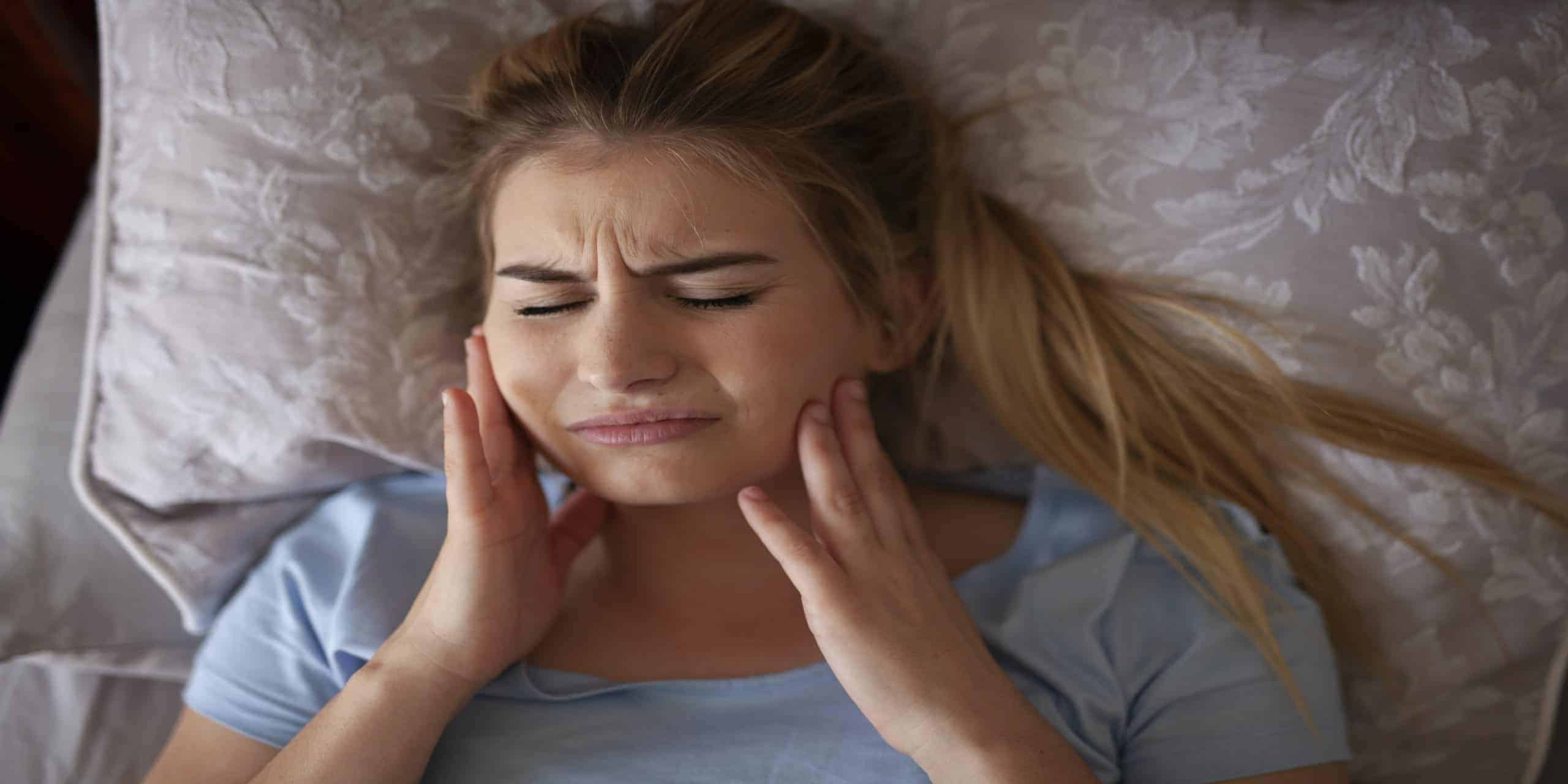If you wake up with a sore mouth from grinding teeth at night, you are not alone. In fact, millions of Americans grind their teeth while sleeping, which can cause an array of negative symptoms. Fortunately, once a dentist can find the root cause of your teeth grinding, it can often be treated, and sometimes even resolved. Suffering from uncomfortable pain and not getting a good night’s sleep does not have to go on forever, so remember to speak with your dental professional about your dental options.
What are the signs of teeth grinding?
Teeth grinding, or bruxism, is a common condition when you clench your jaw together and your teeth shift against each other. It can cause pain and discomfort, or it may go unnoticed and not cause many symptoms. The most commonly seen symptoms from untreated teeth grinding includes:
- Worn down enamel
- Headaches
- Ear pain
- TMJ pain
- Fractured or cracked teeth
- Teeth that are flattened, loose, or sensitive
- Worn down restorations like crowns
- Sleep disruption
What causes teeth grinding at night?
Some people tend to clench their jaw and teeth during the day, which can be caused by stress, medication, or personality type. But, teeth grinding at night is often a sign of a medical condition that goes untreated called sleep apnea.
There is a direct link between obstructive sleep apnea and chronic teeth grinding that can have detrimental long-term oral health and general health effects. One hypothesis behind the link is that when someone has a narrow upper airway or sleep obstruction, they grind their teeth to help move their lower jaw forward to increase oxygen flow. This can occur from a person having enlarged tonsils and adenoids, a tongue tie, or a very narrow upper palate.
How can I treat my teeth grinding?
Teeth grinding can be treated by finding the cause of the condition. If you have an underlying condition like a tongue tie, it is best to get an evaluation by your dentist to check if you need a simple procedure like a frenectomy. Chronic bruxism can be a sign of a sleep disorder, therefore treating the symptom without treating the condition is not always beneficial long-term.
Teeth grinding can be diagnosed by any dental professional from a clinical exam and medical/dental history. If your teeth appear worn down and flat or have wear facets that display a darker, yellowish hue, it may be a sign you grind at night.
Here are some of the most commonly offered treatments for bruxism that can help alleviate symptoms and improve sleep.
Nightguard
A custom fit mouthguard is one of the easiest and cost effective ways to manage teeth grinding at night. It prevents your upper and lower teeth from grinding and provides a cushion to avoid harsh forces distributed to your teeth and jaw. A nightguard cannot correct the root cause of teeth grinding, but it is the first step to prevent further damage.
One of the main benefits of a night guard also helps prevent TMJ problems which often happen from bruxism. When people wake up with extreme soreness in their facial muscles, a night guard helps deprogram those muscles to relax them and stop unwanted muscle strain.
Orthodontics
If you have teeth that are not properly aligned, it can cause bite problems. Braces and/or clear aligners are an option if you have a dental malocclusion that prevents your teeth from biting properly. An orthodontist can assess if you need an expansion appliance to help widen the upper jaw, which also improves breathing and sleeping.
Another level of orthodontics that help with teeth grinding include appliances like mandibular advancement devices (MADs) and tongue-retaining mouthpieces. MADs work by helping position the lower jaw and tongue more forward to open the airway. These appliances are custom made and mimic a sports mouth guard. A tongue-retaining mouthpiece also helps with teeth grinding and sleep apnea because it helps keep the tongue remain in the proper position so it doesn’t block the airway during sleep.
Botox
Botox injections alleviate teeth grinding and jaw clenching because it relaxes strong facial muscles that bring the upper and lower jaws together. It also reduces the pain associated with grinding. Still, additional research is needed to confirm how effective and safe this treatment option is and there are always risks associated. However, many people have found temporary relief for a few months with Botox injections.
Is there a difference between types of nightguards?
Unfortunately, not all night guards are created equally. There are three types of nightguards to help with teeth grinding and while they all share the same goal to protect the teeth, there are drastic differences between them.
- Stock night guard: A stock store bought mouthguard is beneficial because it is very affordable and convenient to get. You can purchase it from any sporting goods or convenience store, but it offers the least protection because they are a generic fit. They are not recommended by dentists because they do not support the teeth or soft tissue as well as a custom night guard.
- Boil and bite: This type of night guard is also inexpensive, but provides slightly more protection than a stock night guard. It works by heating it and molding it around your teeth to fit your jaw and soft tissue. They are typically more comfortable than a stock night guard and you can usually mold them again because they’re made from a thermoplastic material.
- Custom night guard: A custom night guard is made professionally by a dental lab and is custom fit to your mouth. It provides the greatest support and comfort because it is stable and durable. A hard night guard helps the muscles relax while sleeping and provides a more proper fit to protect your teeth and jawbone.

